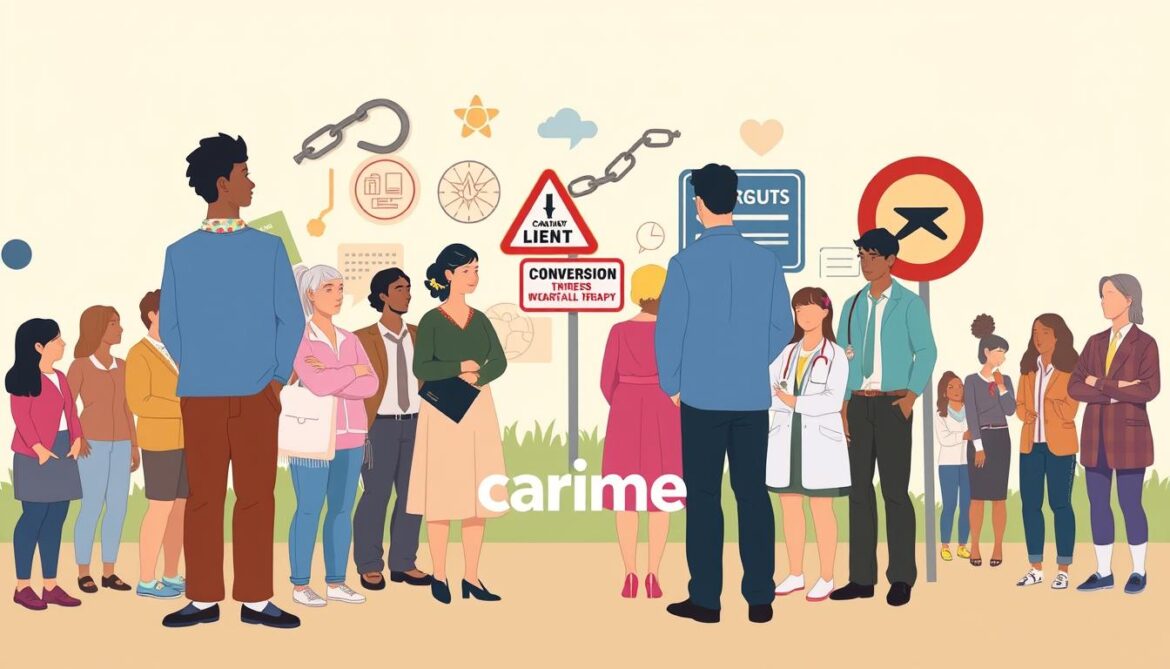Did you know that over 20,000 LGBTQ+ folks in Canada have faced conversion therapy? This shocking fact shows us that harmful practices are still around. In this article, you’ll get tips on conversion therapy prevention strategies and mental health protection tips. These will help battle these wrong practices and ensure fairness for everyone.
Stopping material benefit from conversion therapy is key for the mental health of LGBTQ+ people. By realizing how important this is, you can learn actionable tips and legal advice. These will guide you in tackling and stopping these practices.
Understanding the Harmful Effects of Conversion Therapy
Conversion therapy has gained a lot of attention for its bad impact on LGBTQ+ people. It’s important to recognize its harmful effects. This helps create a safe and supportive environment for everyone.
Psychological and Emotional Impact
Conversion therapy causes a lot of psychological and emotional pain. People who go through it often suffer from depression, severe anxiety, and low self-esteem that lasts. These negative effects deeply disrupt a person’s mental health.
Furthermore, it leads to feelings of isolation and self-hatred. This makes their emotional struggles even worse.
Statements from Medical Associations
Top medical groups, like the American Psychological Association and the American Medical Association, have strongly criticized conversion therapy. They say these practices are unscientific and risky, and they can cause a lot of harm. These groups call for an end to conversion therapy. They also push for better access to LGBTQ+ support resources. This highlights the need for good mental health and support in the LGBTQ+ community.
Legal Landscape in Canada Regarding Conversion Therapy
Canada has stepped forward in defending LGBTQ+ rights, focusing on laws against conversion therapy. These laws show Canada’s dedication to equality and fairness for everyone.
Overview of Bill C-4
Bill C-4 is key in Canada’s fight against conversion therapy, making it clearly illegal. This bill lists the banned actions, like forcing someone into conversion therapy or promoting it. With Bill C-4, Canada adds more support to LGBTQ+ rights legally.
Charter Considerations
The Canadian Charter of Rights and Freedoms is important to Bill C-4’s creation. It makes sure the bill follows Canada’s constitutional values, especially against discrimination. This grounding in the Charter shows Canada’s legal commitment to LGBTQ+ dignity and rights.
Criminal Code Amendments
Bill C-4 caused major updates in Canada’s criminal laws. Now, it’s a crime to make someone undergo conversion therapy or to advertise and make money from it. These legal changes mark a strong stand against conversion therapy, offering better protection for LGBTQ+ rights in Canada.
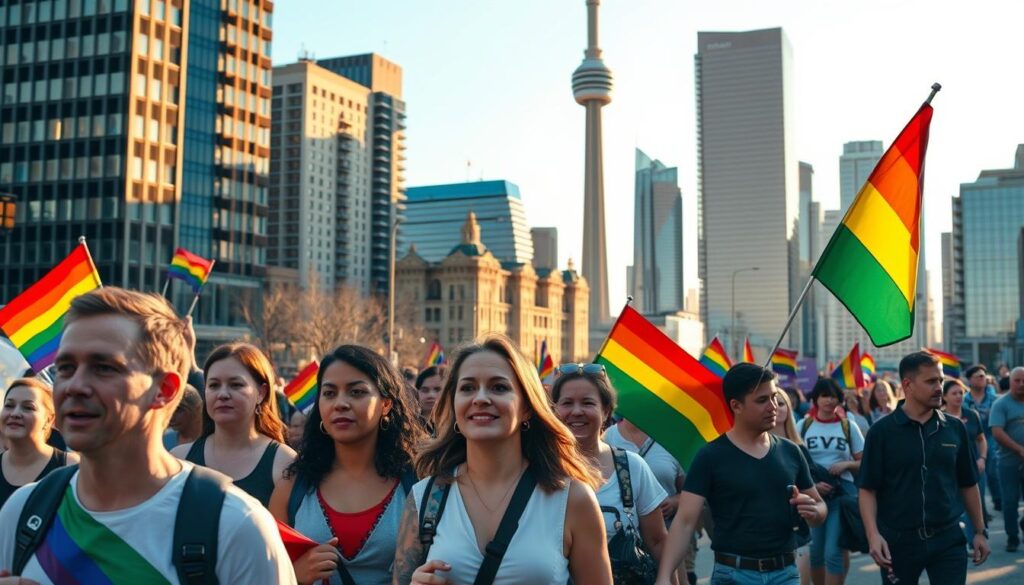
Enforcing Legal Rights for LGBTQ+ Individuals
Standing up for your rights as an LGBTQ+ person is key in fighting against conversion therapy and ensuring fairness. When you report wrongdoings, it helps to make sure those who break the law in Canada are punished. This part offers advice on how to report these crimes, and what legal help you can get.
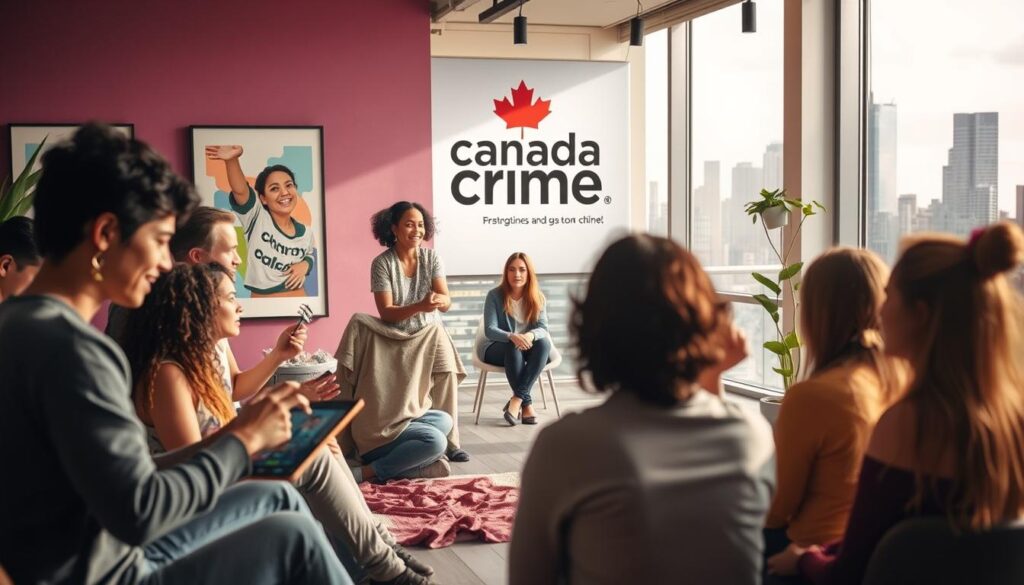
Steps to Report Violations
If you think someone is using conversion therapy, it’s vital to act fast. Here are the steps you should follow to report it:
- Gather crime information like when it happened and what exactly occurred.
- Contact local law enforcement to tell them about the violation.
- Provide canada crime detail so they fully understand what happened.
- Get advice from lawyers who know about LGBTQ+ rights to help you.
Legal Supports and Resources
Finding the right legal help can make a big difference in defending your rights and seeking justice. Here are some good resources in Canada:
- Legal aid services that help with therapy alternatives for LGBTQ+ community.
- Groups like Egale Canada that support and inform LGBTQ+ people.
- Pro bono legal clinics that offer free advice.
By following these steps and using these resources, you help create a safer place for the LGBTQ+ community in Canada. It ensures those who harm your rights are legally dealt with.
Tips to Prevent Material Benefit from Conversion Therapy
It’s crucial to stop people from making money off conversion therapy. This helps protect the rights and wellness of LGBTQ+ people. By knowing how these wrong practices work, we can act to stop and report them. Supporting LGBTQ+ people in our communities makes it easier to end such harm.
Identifying and Reporting Financial Benefits
Stopping financial gains from conversion therapy includes spotting and reporting any money made. Look for signs like price lists, proof of payments, and stories that suggest conversion therapy is good. This helps fight against it.
- Monitor promotional materials
- Collect evidence of financial transactions
- Report findings to relevant authorities
“Transparency and diligent reporting can lead to significant crackdowns on institutions that profit from conversion therapies.” – A statement from a leading Canadian human rights organization.
Community Awareness and Education
Educating the community is a strong way to combat conversion therapy. Making people more aware leads to greater care and action. Offering training, campaigns, and support groups creates a safer place for LGBTQ+ folks.
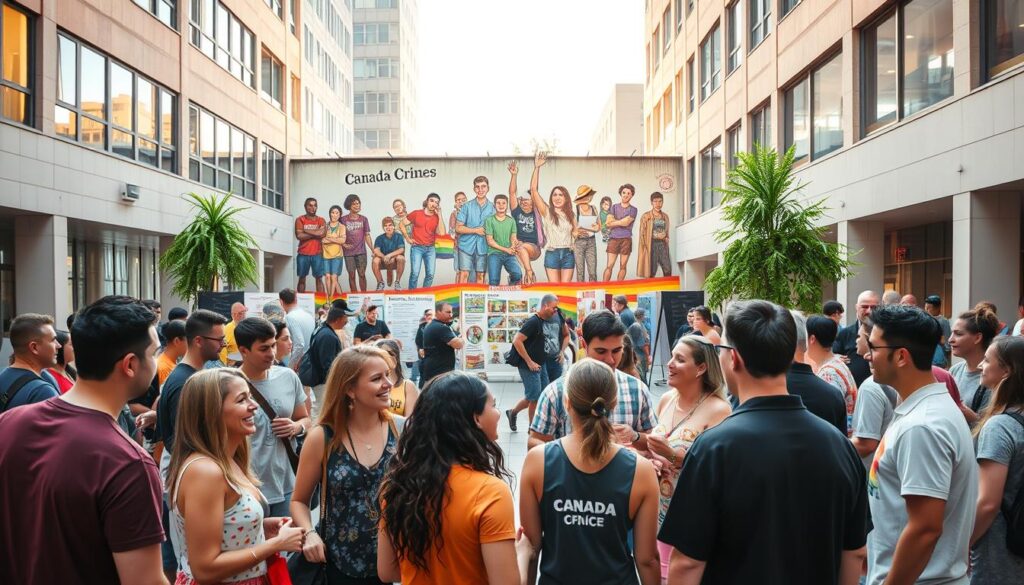
| Action | Details |
|---|---|
| Host Workshops | Engage professionals and community leaders in educational seminars and workshops. |
| Distribute Informational Materials | Provide brochures and electronic resources about the dangers of conversion therapy and how to report it. |
| Support Networks | Build support networks for conversion therapy victims and tell them about their rights. |
Taking these steps and boosting support for LGBTQ+ people helps stop conversion therapy. This also shields those at risk.
Promoting Ethical Therapy Practices for LGBTQ+
Promoting ethical therapy for LGBTQ+ people means endorsing ways that respect their sexual orientation and gender identity. It’s about understanding and supporting them. This creates a safe space for them to explore their identity and feelings.

Approved Therapy Models
Approved therapy models for LGBTQ+ people focus on understanding and affirming their sexual orientation and identity. Key approaches include:
- Cognitive Behavioral Therapy (CBT): Helps change negative thoughts and behaviors.
- Affirmative Therapy: Validates and supports a person’s identity in a nonjudgmental way.
- Humanistic Therapy: Encourages self-exploration and acceptance.
- Family Therapy: Works on improving family acceptance of LGBTQ+ members.
Resources for Finding Ethical Therapists
Finding ethical therapists is key for those in the LGBTQ+ community seeking support. There are many places and guidelines to help you find supportive therapists:
| Resource | Description |
|---|---|
| PFLAG Canada: | Offers a list of affirming therapists. |
| Canadian Psychological Association (CPA): | Gives guidelines for LGBTQ+ friendly practices and a list of qualified practitioners. |
| Rainbow Health Ontario: | Has a list of trained healthcare and mental health professionals. |
| Therapy Route: | A wide directory to find LGBTQ+ affirmative therapists in Canada. |
Using these resources can help you get therapy that supports and affirms who you are. This leads to a better therapy experience.
Supporting Mental Health in the LGBTQ+ Community
Helping the LGBTQ+ community with their mental health is key for boosting resilience and fostering self-acceptance. Having groups that welcome everyone and therapy that fits their needs is critical. This ensures members can face their challenges in healthy ways.
Access to Support Groups
Finding support groups is key for LGBTQ+ people’s mental wellbeing. These safe spaces allow them to share stories, get support, and discover tips for staying mentally strong. Groups like PFLAG Canada and The 519 in Toronto are great for finding or starting such groups.
Therapeutic and Counseling Alternatives
It’s crucial that LGBTQ+ folks have the right therapy choices. Their therapy should affirm who they are and boost their wellbeing, never trying to change them. Options like Queer-focused therapy, Cognitive Behavioral Therapy (CBT), and online counseling can offer helpful support.
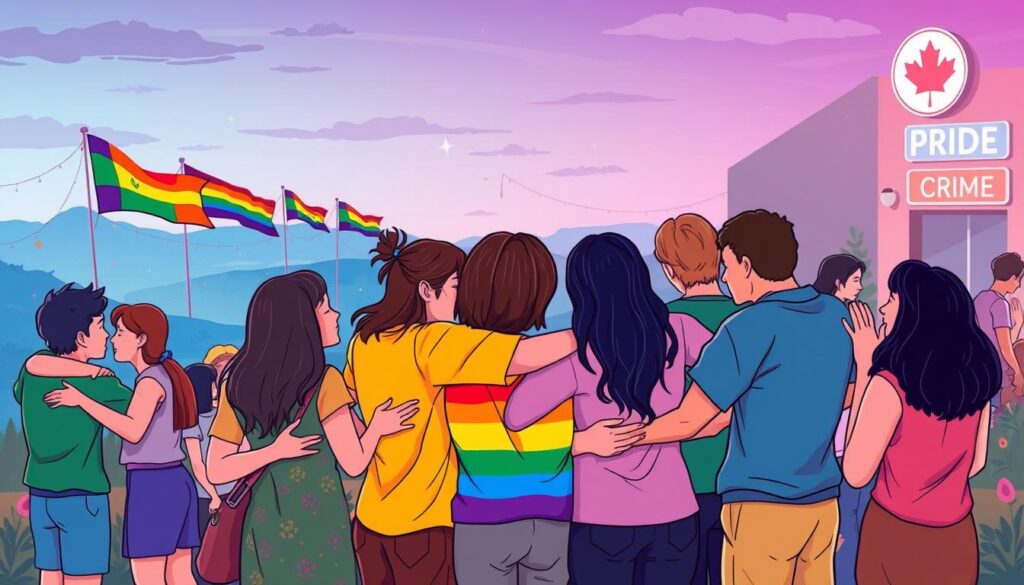
Peer counselors and LGBTQ+ professionals play a big role. They help guide people to therapy choices that truly back their mental health and better their lives.
Engaging in Community Support Initiatives
Supporting LGBTQ+ people in your community is key to creating a welcoming space for everyone. By doing this, you become part of important work that helps improve LGBTQ+ lives. Let’s look at ways to get involved:
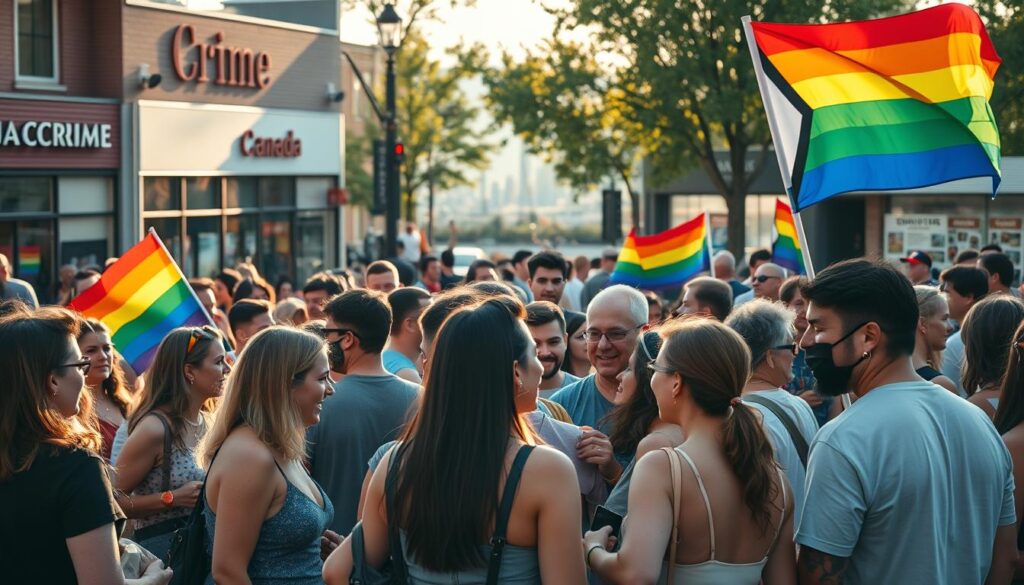
Local LGBTQ+ Organizations
Local LGBTQ+ groups are crucial in offering services and fighting for rights. They provide support like counseling, legal help, and events that bring people together. Working with these groups lets you help tackle big issues, such as conversion therapy.
Volunteer and Advocacy Opportunities
Volunteering for LGBTQ+ organizations can help you grow and make a difference. You can join in on campaigns or events meant to educate and support. By giving your time and talents, you boost support for LGBTQ+ people and make sure they can get the help they need.
Educational Campaigns Against Conversion Therapy
Educational campaigns play a big role in warning people about the dangers of conversion therapy. They help everyone know why these practices are harmful. Through different ways, they make sure communities are informed and ready to fight against conversion therapy.
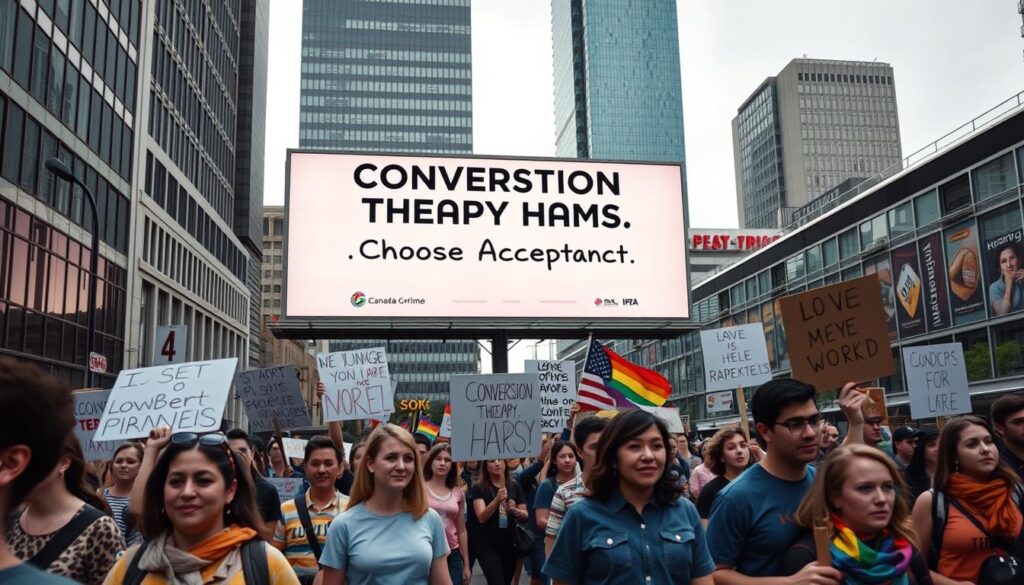
Building Awareness Through Media
Media is a powerful way to spread the word about the dangers of conversion therapy. TV shows, social media, and public announcements can reach many people. They can clearly show why conversion therapy is bad. This makes more people understand and care about stopping it. You can learn more about these efforts in a government report here.
Educational Institutions’ Role
Schools and colleges are key in fighting against conversion therapy. They teach students about its dangers and promote acceptance. These places can also work with groups to hold teaching events. For more details, check out an article on hate crimes in schools at Canada Crime.
Ensuring Policy Implementation and Monitoring
Success with initiatives to stop conversion therapy depends on putting policies into action and keeping a close eye on them. Ensuring Policy Implementation and Monitoring needs teamwork from different groups. This includes government agencies and charities.

Role of Government and Nonprofits
Government organizations should lead by enforcing laws against conversion therapy. They need to build a strong system for going after violators and protecting victims. At the same time, charities are crucial for pushing for change, educating people, and offering help. By working together, they can share tips to prevent material benefit from conversion therapy. This makes sure there’s a financial downside for those still doing it.
Community Reporting Mechanisms
A key part of ensuring policy implementation and monitoring is setting up good community reporting systems. People in the community have to know how to spot and report conversion therapy cases. These systems help uphold the laws and moral guidelines given by the authorities. They also give people clear directions and support for reporting wrongdoings.
When the government, charities, and everyday folks work together, they can protect the rights and respect of LGBTQ+ people. This way, we can move away from the damage caused by conversion therapy.
Conclusion
Stopping material benefits from conversion therapy is key to creating a better, more supportive community. We need both legal steps and community support to stop conversion therapy. It’s important since it can deeply harm people mentally and emotionally.
Studies show it can cause issues like anxiety, depression, and even PTSD. This shows why we must find ways to prevent conversion therapy.
Laws like Canada’s Bill C-4 are important for protecting LGBTQ+ people. This bill includes important legal changes that help fight against harmful practices. Legal measures are crucial to ensure LGBTQ+ individuals’ rights are protected.
We must also focus on advancing ethical therapy for LGBTQ+ people. Supporting good therapy practices helps the well-being of these communities. It means finding therapists who follow ethical guidelines and focusing on mental health.
The European Parliament and the UN urge nations to act against conversion therapy. A mix of policies, community efforts, and education is key to ending it. By doing this, we’re working towards a world where everyone is respected and treated fairly.

